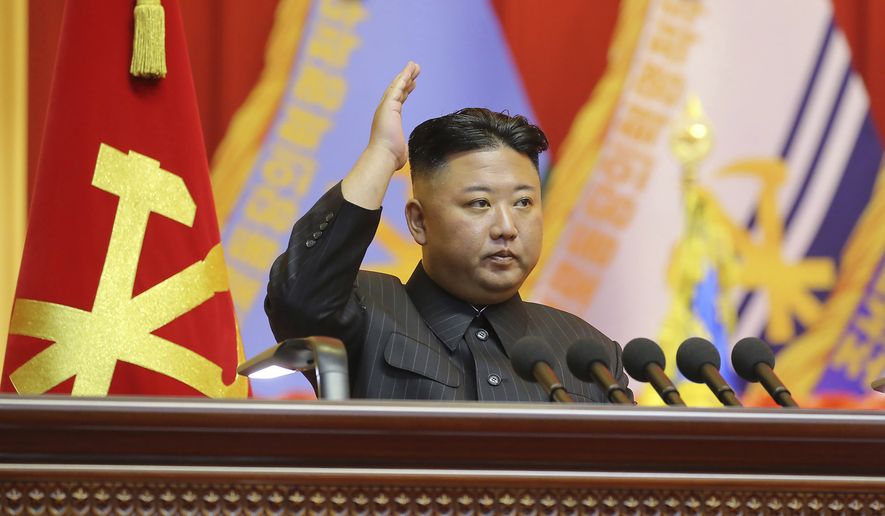North Korea’s ruling regime sees no strategic benefit in improving relations with the United States and remains bent on developing nuclear weapons and advanced missiles whatever the outcome of talks with Washington, the top U.S. intelligence officer on North Korean behavior said Tuesday.
Sydney Seiler, the national intelligence officer for North Korea, pointed to repeated examples under Presidents George W. Bush, Barack Obama and Donald Trump in which the regime in Pyongyang spurned diplomatic outreach from U.S. officials in favor of continuing to develop its weapons program.
Speaking during “The Washington Brief,” a virtual event series hosted by The Washington Times Foundation, Mr. Seiler reflected on the most recent period of historic outreach by Mr. Trump to North Korean leader Kim Jong-un in a series of three personal meetings starting in June 2018.
The Kim regime has “simply squandered away an opportunity to move forward with the United States in a better relationship,” Mr. Seiler said. “When you look at this continued pattern of behavior, you come to a conclusion that, at the end of the day, Pyongyang calculates — or at least the Kim regime calculates — its survival in no way is related to an improved relationship with [South Korea] and is not even related to an improved relationship with the United States.”
It’s a sobering assessment from a top analyst in the Office of the Director of National Intelligence advising the Biden administration, which recently completed a review of U.S. policy toward North Korea. The administration has adhered to a restored policy of “strategic patience” toward Pyongyang — essentially deterrence through sanctions and military pressure — following the high-stakes direct meetings that Mr. Trump favored but failed to produce a denuclearization agreement.
The Biden approach has kept the door open for talks, but Kim regime has yet to respond. The regime this week warned that “hostile” U.S.-South Korean military drills planned for later this month could derail a potential return to diplomacy.
There are nearly 30,000 U.S. troops stationed in South Korea and the annual U.S.-South Korean military drills became a major political football during the Trump administration. Mr. Trump suspended them in pursuit of an elusive personal denuclearization deal with Mr. Kim.
The Kim regime has long condemned the annual joint military drills, insisting they are a rehearsal for a potential invasion of the North.
Despite the current friction, Seoul and Pyongyang revealed last week that they had agreed to restore a long-inactive hotline designed to minimize tensions. It also was learned that Mr. Kim and South Korean President Moon Jae-in, a longtime supporter of engagement with the North, had exchanged letters since the spring on possible ways to improve ties.
Alexandre Mansourov, professor at Georgetown University’s Center for Security Studies, said Tuesday that the North Koreans are engaged in a kind of “carrot-and-stick diplomacy” threatening the U.S. and South Korea at times while offering concessions and diplomatic overtures at others, while always pursuing some strategic initiative.
“It’s not about the [military] exercises, it’s about Kim’s desire essentially to see how much mileage he can squeeze from the lame duck Moon Jae-in presidency before it leaves office next February and, in particular whether he can use the Moon administration to get the Biden White House to lift the U.N. Security Council sanctions on North Korean exports of minerals and refined petroleum,” Mr. Mansourov said during Tuesday’s “The Washington Brief.”
He appeared as a panelist with Mr. Seilier, as well as with former CIA official and longtime U.S. diplomatic adviser Joseph DeTrani and former U.S. Ambassador to South Korea Christopher Hill, the moderator of the virtual event series.
In his own comments on Tuesday, Mr. Seiler suggested Pyongyang’s posturing fits within decades-old pattern of on-again, off-again maneuvering by the regime, whose real goal is survival and weapons development.
Mr. Seiler cited an “often forgotten” 2018 New Year’s address by Kim Jong-un in which the North Korea leader “directed his munitions industry to spur on production, large-scale production of warheads, of nuclear warheads, and missiles — in other words, a reminder that whatever was to transpire in the diplomacy over the 2018 onward period, it would be in the context of an unremitted commitment to expanding qualitatively and quantitatively its nuclear program.”
The speech came even as Mr. Kim headed into a series of one-on-one meetings with Mr. Trump, a period of unprecedented top-down diplomacy that climaxed in the failed Hanoi summit in February 2019. Mr. Trump walked away from the summit claiming Mr. Kim demanded sweeping sanctions relief in exchange for only a limited commitment to destroy part of the North’s nuclear arsenal.
Mr. Seiler said successive U.S. administrations have tried unsuccessfully to coax the regime down an off-ramp from its escalatory behavior.
“We’ve arranged the carrots in different ways in different administrations, you know, but all we’ve kind of learned through all the various carrot arrangements is that Kim Jong-un is not a rabbit and that unfortunately, until now … the regime just has simply not wanted to take these exit ramps,” Mr. Seiler said. “But that’s why it’s so important to keep the door open to dialogue.”
He also stressed that America’s “strength in the region are our alliances,” whether with the South Koreans, with the Japanese, the Australians or others.
“We continue to provide deterrence,” Mr. Seiler said. “We continue to provide assurance and we continue to contain, so no matter how [the North’s nuclear] program advances, North Korea should never be deluded into thinking somehow its new capabilities provide it new options through the use of force to achieve strategic objectives that have to date been elusive.”
“Deterrence has worked for 68 years of armistice,” he added. “I have every confidence it will going forward.”
• Guy Taylor can be reached at gtaylor@washingtontimes.com.




Please read our comment policy before commenting.